Police lights on Clifton Road illuminated the silhouettes of standing students, who were blocking traffic and chanting “black lives matter” as part of a campus protest on Wednesday evening.
In response to recent unrest at the University of Missouri, at Yale University and in South Africa, undergraduate and graduate students voiced their concerns about race relations on Emory’s campus.
“So make sure that when you walk on this campus that we are heard,” said protest organizer and College senior Casidy Campbell to the wall of over 50 students in front of Woodruff Circle.
She turned to face the police cars and cars backed up till Haygood Drive.
“I hope all of ya’ll heard me today,” she shouted. “This what I’m feeling. This is what we’re feeling. And if it’s not recognized then we’ll come back again, and the next day, and the next day. And we will block traffic and you won’t eat and you won’t sleep and you’ll run out of gas. Do you understand me?”
- Photo by Jason Oh
- Photo by Jason Oh
- Photo by Jason Oh
The demonstrators first assembled on Asbury Circle at 5 p.m. to listen to Campbell detail the recent controversial events and other demands for Emory administration.
“They do not provide any type of resources for black students to thrive and succeed at the University,” she said to the group. “Emory prides itself on being diverse so they lump us in here and just expect us to swim.”
In addition, she listed numerous demands for Emory administration that were later posted publicly online. The group’s demands are:
- recognition of traumatic events for black students by the University
- institutional support for black students facing trauma on campus
- repercussions or sanctions for racist actions on campus
- the consultation of black students and faculty during the implementation of diversity initiatives
- higher compensation and positions for black staff and administrators
- tighter job security for black administrators
- increased funding and decreased policing for black student organizations
- more faculty of color in all departments
“So make sure that when you walk on this campus that we are heard.”
As the sun began to set, students — with posters reading “Black students unite or remain forever exploited” and “Students in Solidarity” — marched from Asbury Circle towards Fishburne Drive before looping onto Clifton Road. At the intersection in front of Woodruff Circle, the students lined up underneath the traffic light for about half an hour as police diverted traffic along Uppergate Drive.
At one point, the group of students split apart for an ambulance to drive down Clifton Road but Emory University police did not disrupt the protest.
Before the demonstration, organizers met with Senior Vice President and Dean for Campus Life Ajay Nair to discuss the condition of black students on Emory’s campus “in regards to a true sense of diversity and inclusion,” according to Business School junior Lolade Oshin, who believes that Nair was receptive to their comments.
<“He was glad he was able to meet with us and understand [how black students feel],” said Campbell, who hopes to construct a more specific set of demands than those that were put forth to administrators last year.
Campbell said in an interview with the Wheel that the event began as a response to the student protests against tuition fee hikes in South Africa and the “exploitation of black workers” at University of Cape Town but then realigned itself to also address the “unrest” occurring at the University of Missouri, where the University’s chancellor will step down to a different role after the football team protested how the school has handled racial incidents, and Yale University, where a school official sent an email pushing back against concerns about racially offensive Halloween costumes.
“I think this is such a defining moment in history,” said College junior Serwaa Osei-Danquah, who participated in the event. “It’s now. This is the revolution, and its time that we took over as the young people of the world, as the future leaders of the world. We are the future, and we’re about to make a change, whether people like it or not.”
Khalfani Lawson, a graduate student from the Candler School of Theology, agreed, saying that the event effectively brought these issues to the forefront of campus conversation.
“So now they [question] what it was all about,” he said. “Now they have to take a look and see what’s being going on around the country and, more specifically, what’s been going on at Emory.”
Executive Editor Rupsha Basu contributed reporting to this article.
Correction (11/14 at 7:35 p.m.): In paragraph eight, the word “online” was hyperlinked to an updated list of demands.
anwesha.guha@emory.edu | Anwesha Guha (18C) is from Montgomery, Ala., majoring in English and quantitative science with a concentration in biology. She served most recently as news editor. In addition to the Wheel, she researches and tutors.

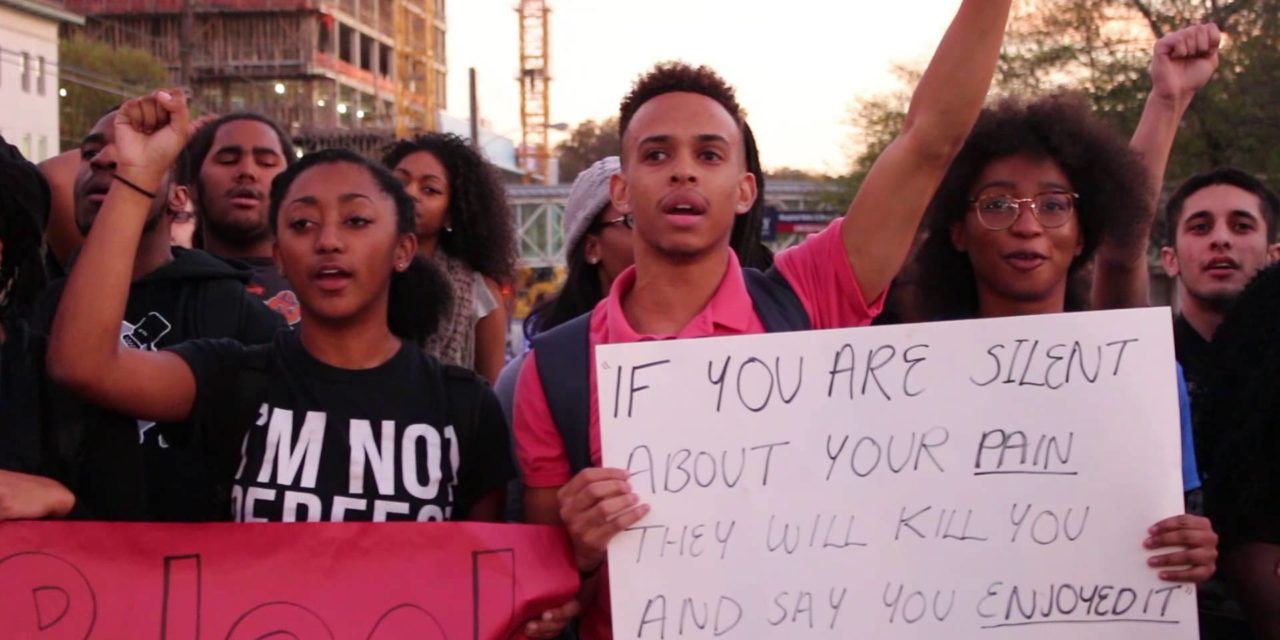
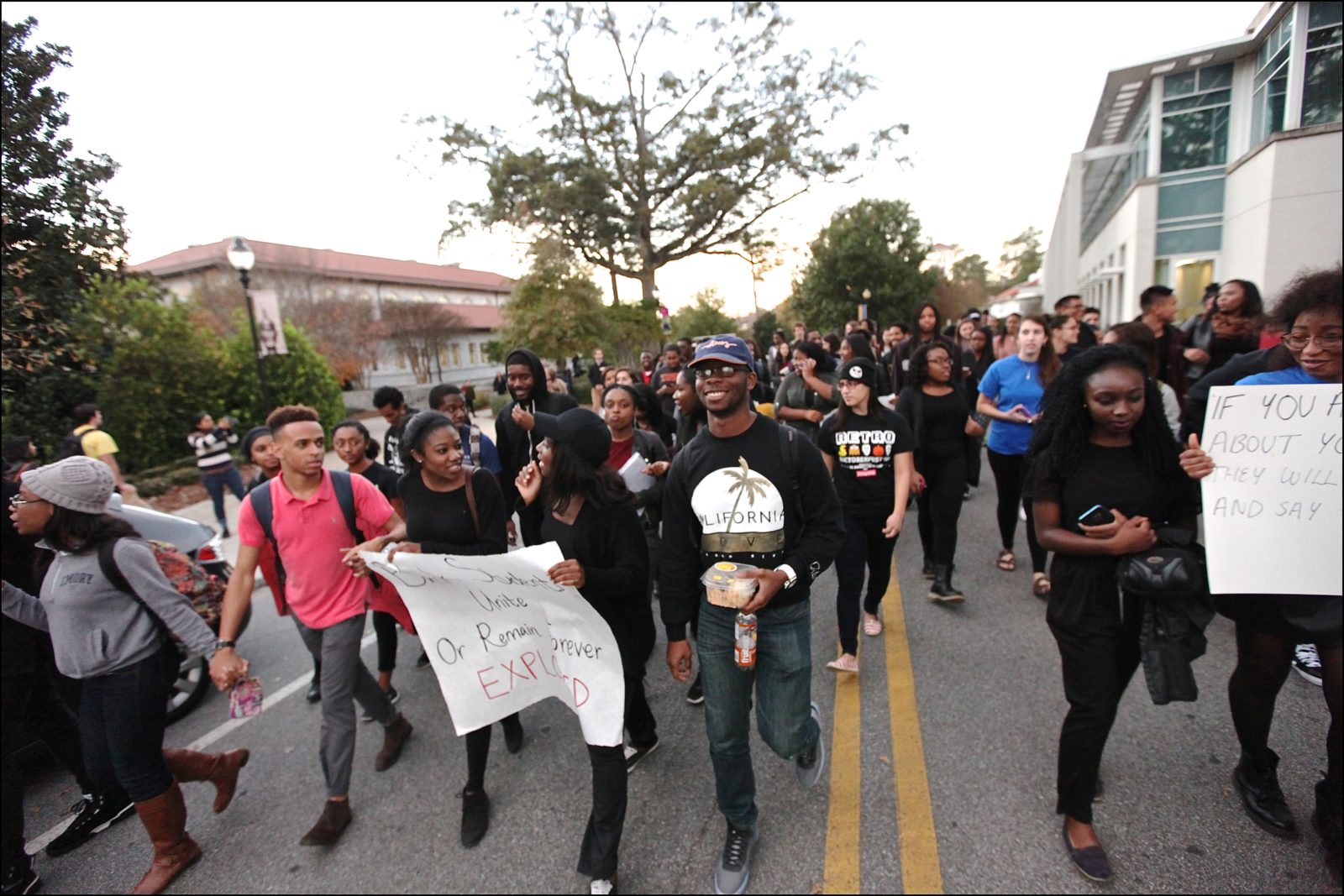
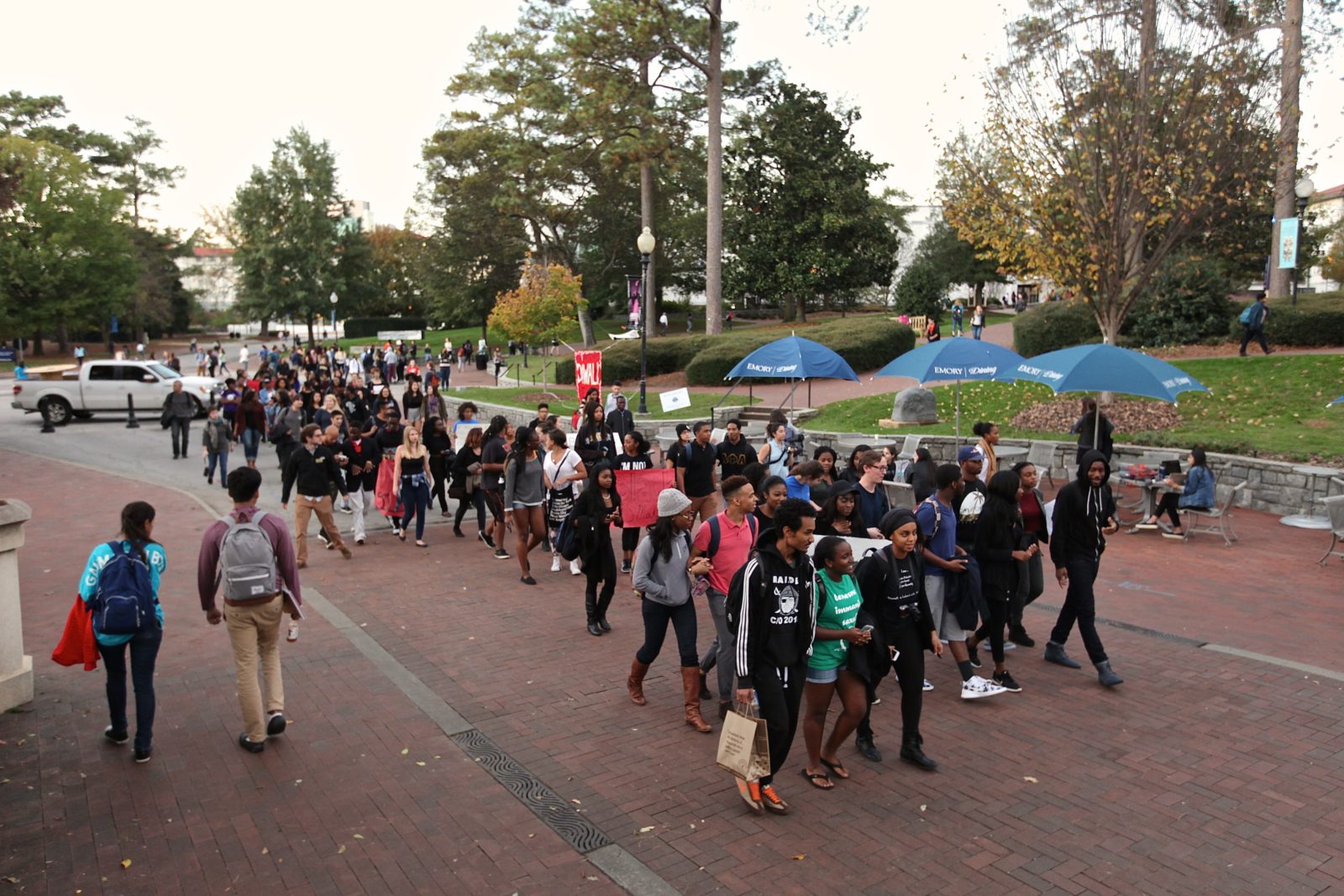
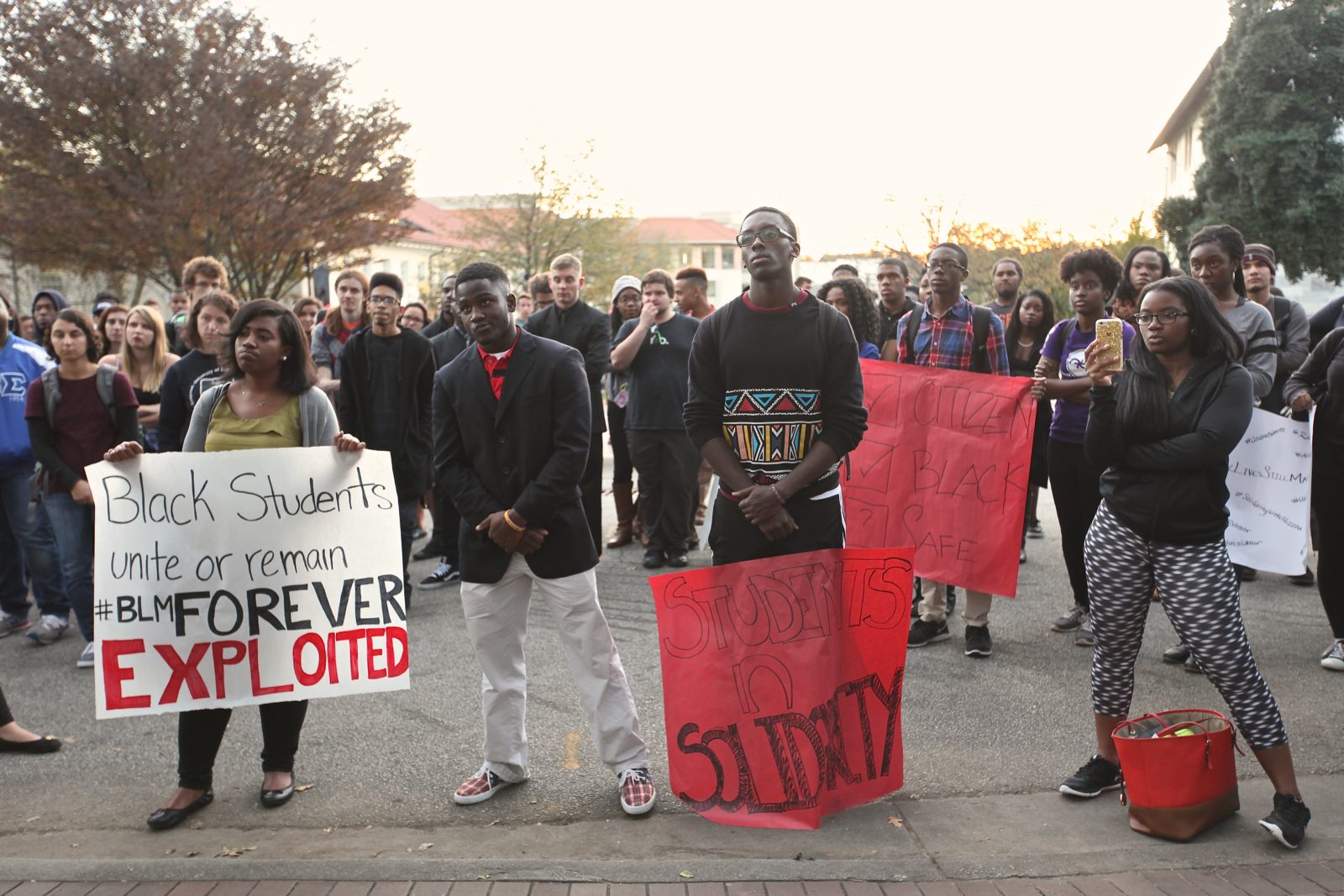


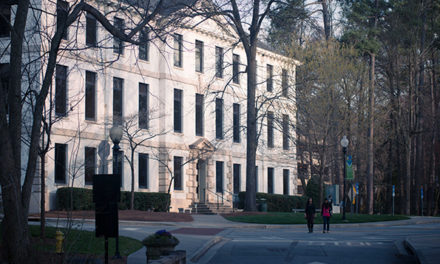
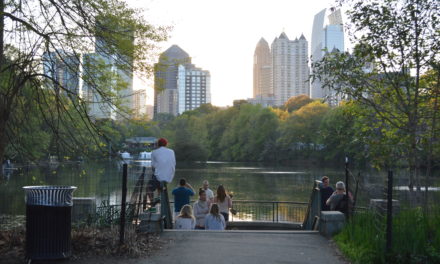

“I hope all of ya’ll heard me today,”
Y’all, what could ya’ll even be a contraction of?
You all . Google is a free site. ?
Y’all is a contraction of you all.
Ya’ll is nothing.
Maybe you should focus on the issue not the typos. ?
Read the article; the most glaring issue was the misspelling of y’all. The rest of it seems pretty inconsequential.
Maybe you should focus on the issue enough to actually look at the statistics of blacks in higher education especially at Emory, like Eb did.
But nah, it’s too fun to be an edgy freshman protesting nothing.
I know a lot of people are going to assume that this is satire, given
that this list of demands is literally asking for extra rights and
seems concerned with the fact that Emory treats its students the same,
regardless of color. Others will view this as satirizing the more
legitimate college movements in other parts of the country where actual
racial tensions and inequality exist on campus. However, I think that’s
because this author buried the lead. If you read closely, you’ll see
this quote, “Emory prides itself on being diverse so they lump us in
here and just expect us to swim.” This is in fact absurd of Emory. As
one journalist put it, “there’s nothing funny about 70 percent of black
americans not knowing how to swim.”
http://www.takepart.com/article/2015/06/29/nothing-funny-70-percent-black-americans-cant-swim
Emory
does not have a football team to aid in this protest, but they do have a
swim team and a world class indoor swim facility that could definitely
be put to better use. Please hear these students today.
Affirmative action and financial aid is not enough these days for the black community. I wonder what the Asian, Hispanic and other non-white cultural groups are doing about the great injustices against them. Probably using their opportunity to get a college education and make something of their lives. These students are given an opportunity to attend an elite university that people all over the world would beg for and this is how they act.
The progressive left has an agenda of unrest in our country and as usual, they can count on the black community to be their pawns.
Do you know that on some campuses – surely Emory is among them – whites and Asians actually have points subtracted from their SAT scores during the admissions process? Is that not incredible? Absolutely amazing. Surely black students want to be considered intellectually equal to whites….so why the pass?
That is a lie. You are using right wing tactics to stir the ___t storm. I am 61, have worked at two Universities. No one is lowering anyone”s SAT scores. If it were done it would be easily traced to the person doing it. They would then be fired.
You are a right wing paranoid in search of a fascist “leader”. Unfortunately, you may just get what you want, just as Germany did in the 30’s.
Go back to your failed Marxist dreams. Those Che shirts are cute. The filthy savage murdered hundreds.
I am somewhere left of liberal/progressive. I do not look at minority unrest as a “pawn”. Oh I understand where your right wing nut paranoia thought bubble leads, but you are wrong. You are calling the kettle black or whatever. You have been filled with fear by fascist goons like Trump and Nathan Deal.
We liberals are loners. No one is doing our bidding and we use no one as a”pawn”. Go buy a gun, put it under your pillow, dream dreams of order.
If they feel so victimized, perhaps they should withdraw from Emory and find another school to attend. One more in tune with their feelings, because feelings are so important in a college education.
These babies need to grow up and realize just how lucky they are. There are people all over the world that envy their good fortune and their opportunity to receive a first class education.
As an aside, I wonder how many of these special snowflakes are paying full tuition.
Is it just me or is this protest in response to…well..nothing? Emory has bent over backwards to make every minority group feel at home on campus, and these people are making absurd demands without stating any reasoning.
Traumatic events for black students? Like what? Did I miss something?
Demanding higher compensation, positions, and job security? Is there any indication AT ALL that black staff/administrators have been treated unfairly in any of these issues?
You just want your voice heard. We get it. But before you speak up be sure you have something to say. Because right now, all I hear is a whiny toddler throwing a tantrum because “The Grown-Ups arent paying enough attention to ME!”
Paul you have indeed missed a lot.
Bent over backwards for minority groups WHERE ?
Minority groups receive way less funding and faculty support. Have you ever seen Emory, the 6 billion dollar endowed Emory, with buildings so old and falling apart that students had to be removed from it and no one knows what is going on? When Emory is constantly undergoing construction to improve facilities and somehow a house designated for your race is constantly overlooked it’s hard to believe you are recognized. I would assume you had not made the trek to the BSA house because if you had this comment would cease to exist on that alone.
How many black or even non white staff members have YOU seen (outside of the dining facilities that is) ? What departments are they in ?
The mere fact that you are more than likely scouring your brain right now to rebut this is a problem.
Paul, I would suggest you take some time to ask a minority student what personally has happened at the institution to traumatize them before you say none have occurred. There have been countless reports of racial slurs thrown at minorities since arrival on campus a few of which come from myself. What do you think I was told when I reported the people by name who frivolously shouted “go home ni***r” to myself and some colleagues and I had witnesses to support my claims?
(No really what do you think happened?) I’m curious to know how you think the university functions.
I do suppose it’s difficult to properly deal with matters such as these when even the president of the institution feels racial marginalization is appropriate, so let’s delve into that a moment, shall we Paul?
Okay so J Wag makes a “mistake” and calls the 3/5ths compromise one of the great pragmatic solutions of our time. Maybe you heard about this issue? Were you also aware that he only provided an apology letter to say he was clumsy and misinterpreted that he merely posted on Facebook after criticism came along? Nothing at all was done to address the black students personally even when he was invited to many forums held after the embarrassing incident.
Later, there is a horrific incident of vandalism that takes place at a frat house, one of anti-Semitic nature, and J Wag rightfully detests the act and in fact said it was an offense against the entire university and continued to provide his condolences to the Jewish community on campus. Why cant these condolences be extended to every group?
What about the incident at the basketball game where a fraternity (the same frat that was attacked by anti-Semitic vandalism that made them feel unwelcome and unsafe) shouted racial slurs at Asian students? Do you think he addressed them Paul?
There are countless examples of racial exclusion from events on campus, disproportionate disciplinary action taken against minority groups clubs and majors, and the fact that you sir as a grown-up, I’m assuming, don’t have to pay attention to any of it shows how very well privileged you are.
Cor prudential possidebit scientiam.
The wise heart seeks knowledge.
To start: $6 billion endowment: Most of that doesnt not belong to the college, but other Emory institutions (med school, law school, hospital), and even if it did belong to the college they are legally not allowed to spend it.
And as for personal experiences with race, I come from a mixed race family, and my 2 step brothers are black. So its not like I’ve spent my life in some white privilege castle or under a rock.
The point of my post is not that there is or is not injustice. My point is that if a group of people wish to make a very bold set of demands from the university, they must be willing to justify them. You can not just say “We want better pay for black faculty!” or “You need to hire more black professors!” You have to address an issue. State the percent of black faculty. State why it is below where it should be. State how you know black staff make any less than their white, latino, or asian counterparts. State what it should be and when that goal should be reached by.
I think there is merit in todays modern civil rights movement. I can’t even count the number of times police have searched my car when I was spending time with my brothers. But when I see things like this it upsets me because it detracts from the societal value of the movement.
There are people being shot and jailed because of their race. So you must forgive me for finding it a little absurd when people decide to block traffic because a University that does so much good for so many didn’t give them a new house or hire “enough” minority professors.
To start: 6 billion dollar endowment was mentioned to highlight the magnitude of prestige the university has.
And as for personal experience “my 2 step brothers are black” lol.
Oh Paul, how hard for you. I wont even get into that.
Had you stated that justifications should be listed in the letter with possibly some quantitative data we would indeed have the same sentiments. Instead you decided to say the protest is in response to “nothing” and “traumatic experience where” as if nothing has occurred which turns the argument Into if there are any injustices. Admit traumas have occurred time and time again but it would be useful and necessary to see it listed because indeed it would be but that doesn’t make the protest unnecessary.
Yes Paul, people are being shot and jailed for race but not ALL people. It’s the discrimination that is the problem.
Inequality due to race is a problem. So excuse me if I find it absurd that there is not “enough” representation amongst staff for all people, there are not adequate houses for all people, there is not equal addressing of trauma. Can you imagine if every house was in the state of the BSA house without explanation ? Do you think that would ever be allowed?
You find “merit in today’s civil rights movement” as if it’s an extra curricular activity. I find survival in it.
Also, in this case or analogy the fire would come from the drapes Paul. These disproportionate murders of minorities, specifically the big ones in the media, were not caused by uneducated individuals. Those murders, or officers, attended colleges and universities. Discrimination is perpetuated by common day society which is a huge issue but to have it appropriated by educational institutions that are molding the minds of 18-22 year olds who will become future leaders will indeed be the spark to set “the house” ablaze.
In short: a threat to justice anywhere is a threat to justice everywhere .
Okay so, according to a 2007 survey by The Journal of Blacks in Higher Education, Emory’s faculty was 6.8% African American. The total African American population in the United states is 13.2%. You cannot expect black faculty to make up a majority or even a 50/50 balance at a university when they only make up 13.2% of the population. Also, most professors have to have earned PhD’s to become faculty at institutions of higher education. In 2010, according to the Institute of Education Sciences, only 7.4% of the PhD’s earned were by blacks. Also, when black professors desire to work for historically black colleges and universities that means even less applying for other colleges and universities. You have to look at the facts. In 2007, Emory actually had the highest percentage of black faculty and staff out of the 26 highest ranked universities that participated in the 2007 survey of black faculty and according to the Journal of Blacks in Higher Education the very small number of blacks pursuing Ph.D.s in engineering and the natural sciences is mirrored in the low percentages of black faculty at science-oriented institutions such as Carnegie Mellon University and Johns Hopkins University. Also, the BSA house is in NO WAY the only thing in disrepair at the university. The Woodruff P.E. Center that houses Athletics, the recreation programming, main student fitness areas and the P.E. Program has equipment in it that is so old that there are not even proper replacement parts for it. This space is used by a HUGE mix of students and has been falling apart for years and YES the university allows it to happen despite students pleas to have equipment replaced. Emory decides where to put its funding and it does not always go towards the well being of students but it is definitely not just in a discriminatory manner against black students.
Joy – and you sound like a real joy to be around – you can have your own opinions, but not your own facts. You write: “These disproportionate murders of minorities, specifically the big ones in the media, were not caused by uneducated individuals. Those murders (sic), or officers, attended colleges and universities.”
For the record, around 93 percent of black homicide victims were killed by other blacks. One or two percent were killed by police officers. Of course this does not excuse any police officers who killed anyone without justification, but we should deal with the facts, not unfounded claims.
Your ignorance about the real statistics suggests to me that you have been fed some misinformation by people with radical political agendas. It’s astounding that students at a top 20 national university act like they are mistreated as badly as minorities 60 years ago who encountered much more real racism and mistreatment.
Seriously, this began because they wanted to protest what is going on in South Africa??? Please, feel free to go there to protest. I am sure you will be welcomed with open arms. South Africa is a much more accepting culture.
No resources? Emory University has more resources than many campuses I have been a part of! Office of multicultural programs and services, office of equity and inclusion, Student health and counseling services (that provides ALL students with aid when going through trauma), department of African American studies, the Institute for the study of Race and Difference, the Black Student Alliance, the Emory chapter of the NAACP, African students association… should I go on?? How is this “no resources for black students??? Plus… you want higher salaries and better job security? WHO DOESN’T?????
Welcome to the Brave New World. Do not worry though. Many government and big corporations, and indeed, colleges and universities, hire minorities at much higher salaries than whites or Asians. It really is pathetic, because the minorities who work hard and earn their good grades are definitely tarnished. Heck, even I (adoptive father of a minority child) tend to prejudge black applicants these days. And is it fair? Well, yes indeed. It is. I want people like AJ working for me, but sadly the trash gets through too often. And then it is whine, whine, whine, and threaten. I have had enough of it.
Personally I think they should all get straight A’s and Emory should ensure they have a high paying job after they graduate, no matter their ability! Reparations, yo!
I think Emory extends plenty of opportunities to minorities, especially to the black community. If the individuals who support this type of ‘activism’ do not feel that this support is enough, then they should find ways other ways to fulfill their needs, as they are out there. Resorting to pointing fingers at the University and blaming it on them, is this right? One can always find the bad, or in this case inequalities or differences, in things if they continuously look for it.
‘Movements’ like this will get the black community nowhere. It needs to prove to society that it is more than the stereotypes that society (and the community itself) has surrounded it in. That doesn’t mean the community should let go of it’s culture, but it does mean that maybe it should change it’s perspective on what really is the problem. Is this a problem that is more easily fixed by pointing fingers at others or at oneself?
To clarify, I am mixed; black/white. I have been offered and directed to a number of benefits of being a minority at Emory. For me, personally, this is not how I would go about finding ways to change things or acquire a better quality of life. I want to look back on my life and feel that I became successful because of hard work, skill acquisition, etc. and not because I am a minority. I will fail or succeed by my own actions and not blame others for the hardships of life.
Well said. Thank you for standing up for intellectual integrity. Maybe the Dean and Provost will follow suit.
Unbelievable. Spoiled, pampered, brats. Do they not realize that they attend one of the richest universities in the South, and benefit from programs specifically designed to benefit them – namely affirmative action, minority scholarships, and special internships? Their sense of entitlement rivals anything I have ever seen among white students. I hope that they get the snakes out of their heads before entering the real world.
what a load of…
So nice that they could take time out from their Black/gender/women/minority STudies classes to protest.
You liberals built this, eat it.
I’ll bet that most of them are there due only to Affirmative Action. They can’t do the work, and learn, and they don’t want anyone else to learn anything either. So, they spend their time complaining, blaming others for their failures, and causing as much disruption as possible.
One of THE most expensive private universities around. Tell me boys and girls (because you are still young enough and immature enough to be called that), how do YOU pay for your education? Are you there on grants? Did your folks foot the bill? How many of you are working full time and going to school?
Your list of demands echo those of the 60s communists. They are nonsensical and pointless. Your parents should have told you it is time to grow up and be responsible. NO ONE caused your pain. You think you are entitled and you are not.
Get over your own selves
Welp… It has been about 7 months since this “pivotal moment” came and went. I am just now even hearing about it. Oh well.